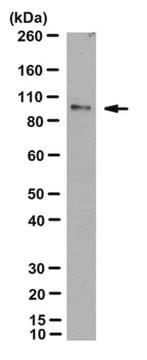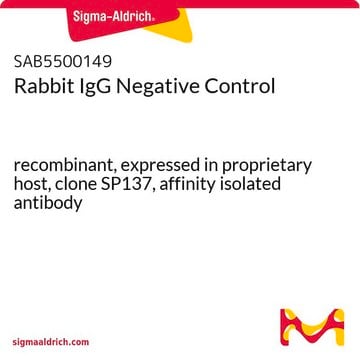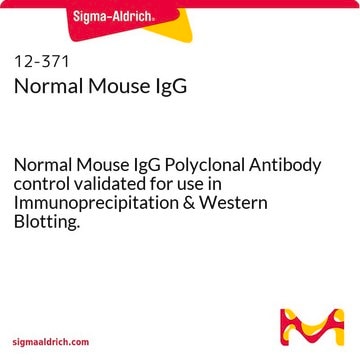SAB4200084
Monoclonal Anti-AGO1 antibody produced in rat
~1 mg/mL, clone 4B8, purified immunoglobulin
Synonyme(s) :
Anti-Argonaute-1, Anti-Eukaryotic Translation Initiation Factor 2c, subunit 1, Anti-GERP95, Anti-Golgi Endoplasmic Reticulum protein 95 kDa
About This Item
Produits recommandés
Source biologique
rat
Niveau de qualité
Conjugué
unconjugated
Forme d'anticorps
purified immunoglobulin
Type de produit anticorps
primary antibodies
Clone
4B8, monoclonal
Forme
buffered aqueous solution
Poids mol.
antigen ~95 kDa
Espèces réactives
human, canine, mouse, monkey, bovine
Concentration
~1 mg/mL
Technique(s)
immunoprecipitation (IP): suitable
western blot: 1-2 μg/mL using HEK-293T cell extracts
Isotype
IgG2a
Conditions d'expédition
dry ice
Température de stockage
−20°C
Modification post-traductionnelle de la cible
unmodified
Informations sur le gène
human ... EIF2C1(26523)
mouse ... Eif2c1(236511)
Description générale
Immunogène
Application
- Monoclonal Anti-AGO1 antibody produced in rat has been used in:
- western blotting
- immunoprecipitation
- chromatin immunoprecipitation(CHIP) assay
- RNA immunoprecipitation
- RNA-nChIP experiments
Immunoprecipitation (1 paper)
Actions biochimiques/physiologiques
Forme physique
Clause de non-responsabilité
Vous ne trouvez pas le bon produit ?
Essayez notre Outil de sélection de produits.
Code de la classe de stockage
10 - Combustible liquids
Point d'éclair (°F)
Not applicable
Point d'éclair (°C)
Not applicable
Certificats d'analyse (COA)
Recherchez un Certificats d'analyse (COA) en saisissant le numéro de lot du produit. Les numéros de lot figurent sur l'étiquette du produit après les mots "Lot" ou "Batch".
Déjà en possession de ce produit ?
Retrouvez la documentation relative aux produits que vous avez récemment achetés dans la Bibliothèque de documents.
Notre équipe de scientifiques dispose d'une expérience dans tous les secteurs de la recherche, notamment en sciences de la vie, science des matériaux, synthèse chimique, chromatographie, analyse et dans de nombreux autres domaines..
Contacter notre Service technique








